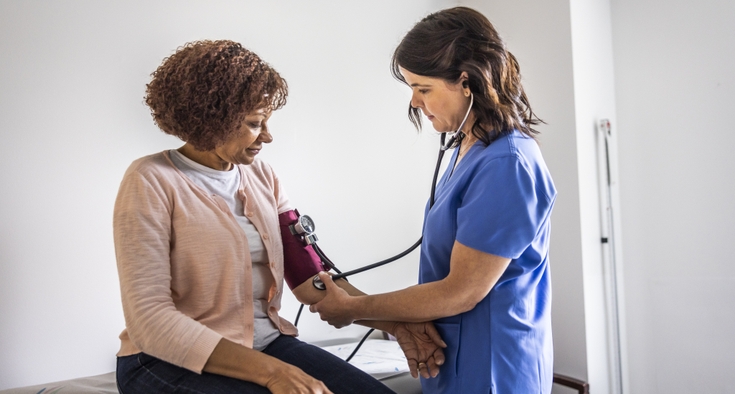Dr. Kate White has come to expect the question: “You’re a gynecologist, so why are you talking to me about cardiovascular disease?”
And the Novant Health Lowcountry OB-GYN - Mullis doctor has a ready answer: “Most women don't understand that they have an increased cardiovascular disease risk during and after menopause.” To make matters worse, women aren’t referred to cardiologists as often as they should be.
When we profiled White in June for being the third woman in her family — after her mother and grandmother — to become a physician, she shared a startling fact: "Women’s cardiac health is better than men’s until menopause. When our hormones start changing, our cardiac health becomes worse than men’s.”
Before menopause, women also have more good cholesterol (HDL) and less bad cholesterol (LDL). That, too, changes during “the change.”
We wanted to learn more. Why does women’s cardiac health worsen after menopause?
It comes down to loss of estrogen, which leads to a cascade of metabolic changes — increased cholesterol, insulin resistance, weight gain — that all impact heart health.
“When you lose estrogen, you're losing a potent anti-inflammatory,” White said. “Estrogen helps keep blood vessels open, less stiff and more accommodating. Imagine blowing into a balloon. It’s easy to inflate it because it’s so stretchy. But if you thicken the walls of that balloon and try to blow air into it, it takes a lot more pressure. It’s like that when you lose estrogen; your blood vessels lose some ability to dilate and are more likely to become lined with plaque.”
An OB-GYN can help you navigate health changes that come with menopause. Find one near you.
Beyond hot flashes
Women tend to think hot flashes and night sweats are the worst menopause doles out. But there are serious, long-term health risks some doctors aren’t even aware of. More on that later.
“Multiple studies show that hot flashes and night sweats affect 75% to 80% of menopausal women,” White said. “We used to think they were just quality-of-life issues. But now, we know women with frequent and persistent hot flashes have substantially increased cardiovascular disease risk.”
Women who entered menopause early — by age 42 or earlier — and/or had extreme night sweats and hot flashes have a 32% increased risk of cardiovascular events.
That’s because the thickness of our arteries increases with persistent hot flashes and night sweats. And if you start having them early, you have twice the risk of a cardiovascular event, like a heart attack, compared to women with later-onset symptoms.
In other words: They’re big red flags.
Be your own advocate
“Most women have no idea about conditions in their medical history that predispose them to cardiac events, including heart attack,” White said.
That’s not their fault. The connection between menopause and heart health is barely touched on in medical schools — not intentionally, but because most cardiac research has historically focused on men.
Fortunately, the menopause-cardiac health link is beginning to get more attention. White cited “a tsunami of interest” in the subject.
A recent CNN headline read: “More than a dozen states consider laws around menopause care and training for doctors.” And NPR reported, “Doctors don’t get much menopause training. State lawmakers are trying to change that.”
White and her husband, marriage/family counselor Jay White, started a podcast – Heads & Tails – to discuss how menopause can impact marriages and other relationships – and how to navigate “the change.”
When White began having arrhythmia — an irregular heartbeat — in her early 40s, the cardiologist she was referred to chalked it up to stress.
“I had been an OB-GYN for 15 years,” she said. “Stress was nothing new, but the night sweats I was having were. He ran an EKG, but I wasn't asked about perimenopause symptoms. The huge perimenopausal hormone fluctuations were never considered as a cause of these new palpitations. The increased cardiac risk that the night sweats signaled was never discussed.”
“Women have to be their own advocates,” White concluded. If your doctor doesn’t bring up the topic, ask.
Gender and heart disease
Heart attacks can present very differently in women. “Instead of the classic clutching-your-chest moment, it can be as vague as nausea, fatigue, even jaw pain,” White said.
Women who have heart attacks are at a distinct disadvantage. Men are more likely to survive a first heart attack than women are.
More women die from a first heart attack than do men, White said. “That goes back to our smaller coronary arteries that start to thicken with estrogen loss.”
Not only that, but women are less likely to be treated for cardiovascular disease with a statin, White said. Statins — like Lipitor and Crestor — help lower LDL (or “bad”) cholesterol.
“What's interesting is that statins have never been shown to decrease the risk of first heart attacks for women, as they have for men,” White said. “And they have never been shown to decrease cardiovascular death in women.”
Plus, statins carry some risks, such as an increased risk of diabetes, muscle soreness and even stroke in some people. “I’m not saying at all that you shouldn’t take statins,” White said. “Just understand the limits of what statins can do.”
Lessen your risk.
Early intervention is key to addressing potential heart disease. If you’re going through menopause — and it can last for several years — and have extreme symptoms, here are some tips to guard your cardiovascular health:
- Manage your blood pressure. Eat healthfully, get aerobic exercise and do weight-bearing exercise. Pharmacology can’t overcome a bad diet and sedentary lifestyle.
- If you’re concerned about the menopause/cardiac health connection, make an appointment with your OB-GYN to discuss the issue. “It’s a much more nuanced conversation than you can cover during your annual exam,” White said.
- Ask your primary care doctor for an EKG. And chances are, you’ll have to ask. “Statistically, women are much less likely to be offered an EKG — even when one is warranted,” White said.
- Depending on the results of your EKG, consider asking for a referral to a cardiologist.
- Ask your provider about menopausal hormone therapy (formerly referred to as hormone replacement therapy or HRT). If you start it before the onset of cardiac symptoms, you can decrease your risk of cardiovascular events, such as heart attack and stroke.
- If you and your doctor determine hormone therapy isn’t right for you, aggressively treat any other risk factors you have for cardiovascular disease. If you’re on medication for high blood pressure, for instance, stay faithfully compliant.
- If you’re in, or approaching, menopause and looking for a new OB-GYN, look for one certified by the Menopause Society, of which White is a member. “Certainly, there are doctors who haven’t gone through the certification process and are still offering top-notch contemporary menopause care,” White said. “But this is a quick way to find a provider who has an interest in, and is up-to-date on, the topic.”
Dr. Kate White and her husband, marriage and family therapist Jay White, recently started “Heads & Tails,” a podcast about recalibrating midlife. “Menopause can lead to strained – even doomed – relationships,” Kate White has said. Here, the two discuss how women — and couples — can successfully navigate through menopause. Follow White on Instagram at @drkatewhiteobgyn. Follow the couple and their podcast on Instagram at @headsandtailspodcast.












